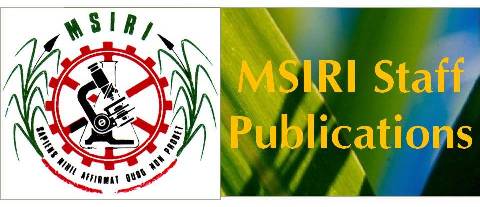A case study of farmer participatory research: minimum tillage of maize on slopes in Rodrigues
| MSI03P3922 | |
| Govinden, N. Tolbize, J. W. Rummun, K. | |
| A case study of farmer participatory research: minimum tillage of maize on slopes in Rodrigues | |
| Lalouette, J. A., Bachraz, D. Y., Bheenick, K. J.(eds), Proceedings Sixth Meeting of Agricultural Scientists, Boname Hall, MSIRI, Réduit, Mauritius, 8-9 May 2003. Réduit: Food and Agricultural Research Council. 340 p. | |
| book chapter | |
| 2004 | |
| p. 291-297 | |
| Also published in Revue agric. sucr. Ile Maurice 83(2&3), 2004: 56-62 | |
| En | |
| En | |
| Maize is the most important crop in Rodrigues, being grown on flat land as well as on slopes, whether terraced or not. Since land preparation cannot be mechanized on slopes, the cost of labour for manual land preparation was identified in a survey as the most important constraint to maize production. Moreover, when land is ploughed at the beginning of the rainy season, the soil is exposed to erosion by water. A possible solution to this problem consisting of minimum tillage was proposed in a participatory planning workshop. Since it involves the use of herbicides with which most maize planters in Rodrigues are not familiar, it was necessary to enlist the participation of planters in the choice of practical options, in the design of trials to test them and in the implementation of the trials on their farms. Ten trials were planted in 1999, nine in 2000 and three in 2002. Four treatments were tested: a control consisting of the normal practice of manual ploughing with a garden fork; a minimum tillage practice consisting of ploughing narrow strips only; and two zero tillage practices, one consisting of clearing weeds with a hoe and the other of spraying a herbicide. Planting holes were then dug for sowing the maize. Most of the trials failed because of drought and, in the end, yield data were obtained from six trials only. At none of the six sites did the tillage treatments have significant effects on yield. This means that ploughing had been of no benefit. All three minimum/zero tillage practices required much less labour than the control, and the savings in labour in the best treatment amounted to more than seven times the cost of purchasing and applying the herbicide. The project was evaluated in a workshop in June 2001 attended by 42 persons comprising planters, extension officers and other stakeholders. Everyone agreed that when maize is grown without tillage, erosion is reduced. A large majority agreed that the maize emerges and grows normally, that weeds are not worse and that less labour is required. However, only one third also agreed that the maize yield is normal. Two-thirds mentioned that they were prepared to change their maize planting method but, because yield is the first criterion in the selection of new practices, demonstrations may still be needed to convince more planters. | |
| Maize on-farm trials no till soil erosion labour bottleneck farmer participatory research Minimum tillage cultivation systems | |
| Rodrigues | |
| Maize | |
| Minimum tillage | |
| 2003-05-09 | |
| En | |
| MSIRI; Agricultural Services Citronelle | |
| LIB | |
| cat | |
| FC Irrig |
